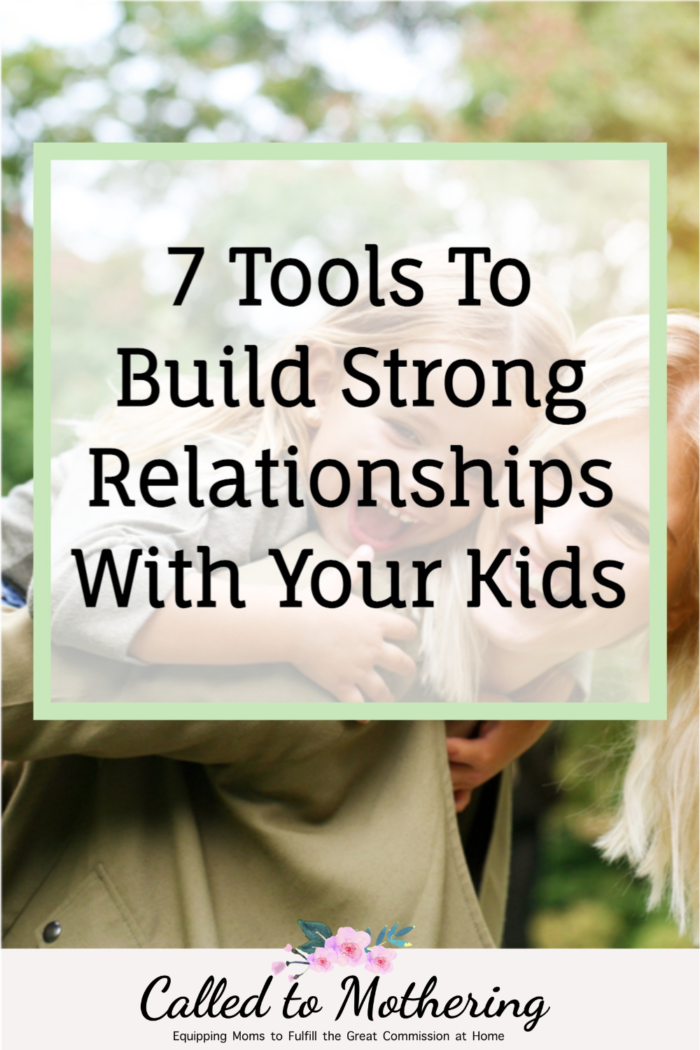
Someone wisely said once, “Children don’t rebel against rules; they rebel against a lack of relationship.” Strong parent/child relationships are not only critical for your kids’ spiritual formation, but also their success in life.
Relationship is more than just living together as a family; it’s a heart response. It implies a deeper connection that communicates, “I know you and I enjoy being around you.”
Building relationship is foundational for passing the faith on to your kids. It’s the channel through which spiritual training becomes effective.
If we’re going to impress God’s commands on our children’s hearts as we “sit in our house and walk by the way and when we lie down and when we rise up”, relationship simply isn’t optional.
But strong relationships with your kids don’t just happen. Building and maintaining close bonds takes work, and it can become more difficult to connect with your children the older they get.

Be Intentional
Take the initiative to get to know your child’s interests, natural abilities and love languages.
Find out what they’re passionate about. Ask them lots of questions about those interests and actively listen to what they’re saying.
Suggest they teach you how to play whatever game or sport it is they like. Schedule mommy/son or mommy/daughter dates with each child once a month so you can focus on them individually.
Try different things and make mental notes of what works and what doesn’t.
Stay Focused
If the goal of an activity is to deepen closeness, then save the instruction giving and correction for another time.
Noncritical listening breeds closeness. For a few minutes, you may have to look past the wiggles of a preschooler or the misplaced values of a preteen.
Of course, parenting sometimes requires that you give up what you thought might be a special relational time because your child needs some form of discipline right then, and that’s okay.
Don’t get discouraged; try again another time with the primary goal of developing closeness.
Be Available
Relationships don’t always grow on a schedule. Your elementary-aged child may open his heart to you just as you’re trying to tuck him in at night. Your teenager may come home from an activity and be eager to tell you all about her day.
Be on the lookout for opportunities when your child is reaching out to you.
It may be subtle or at an “inconvenient” time, but if possible stop what you’re doing and give your full attention.
Do Activities Together
Working together to accomplish a goal is a great relationship-building tool. Cleaning up the yard, making a new recipe for dinner, or going on a family trip to the park or lake all have the potential to deepen relationships.
Maybe your daughter is into acting and you could join a community theater with her. Maybe your son likes to exercise and you could ride bikes with him once a week.
Whatever it is, working and playing alongside your kids builds connections!

Develop Traditions
Family traditions bring closeness and develop strong family bonds.
My kids look forward every Thanksgiving to helping us make a giant feast with all the trimmings. Every Christmas, they get excited about making a paper “countdown” chain with Scriptures about Jesus’ birth to hang on the tree.
Whether it be holiday traditions, a favorite family vacation destination, or even a Saturday morning breakfast ritual, these all contribute to making memories. And memories lead to relationship building!
Connect With Your Child’s Heart
Relationship is more than just spending quality time together. It involves connecting with a child’s heart.
Since we so often get focused on tasks, it’s vital that we seek ways to connect emotionally even in the midst of taking care of family business.
You might ask yourself: what longings, hopes and desires does my child have? What are the top three stressors in his or her life? Then, think about how you can bring joy into your child’s life or help ease the burdens they’re facing.
And, although advice and problem solving might help a kid who is overwhelmed with excitement about a new opportunity or discouraged by a disappointing event, it’s most important right then to empathize with your child’s feelings.
Be Aware of Changing Dynamics
Older children often connect with their parents differently than when they were younger. As preschoolers and elementary-aged kids, they curled up on the couch for a read-aloud or favorite movie and leaned in close for hugs and snuggles.
Gone may be those days when tickling games, fun desserts, cute nicknames and family outings all brought feelings of closeness.
Now, conversations about feelings and opinions, and sharing in a hobby or skill is what’s in order for you to connect with your tween or teen.
They may respond well to being treated more like an adult at times. Other times, they might need to relive tender, playful moments.
Watch your growing child and be sensitive to the ways he or she wants to interact. Doing this can make even closer relationships possible!

Close relationships between parents and children are the tool to help kids grasp the convictions they’ll need to be the person God intends for them to be.
The world may be shouting all kinds of messages at our kids, but if our voice is loudest, it will help them tune out these destructive voices and stand strong in their beliefs.
These bonds we form with our children are important, too, because they ultimately mimic the kind of love God has for us. God uses His relationship with us to help us learn and grow.
In the same way, your relationship with your children is a springboard for helping them catch the faith and live it out on a daily basis!
Learn more about how you can improve your relationships with your kids by enrolling in my parenting course!


Leave a Reply
You must be logged in to post a comment.